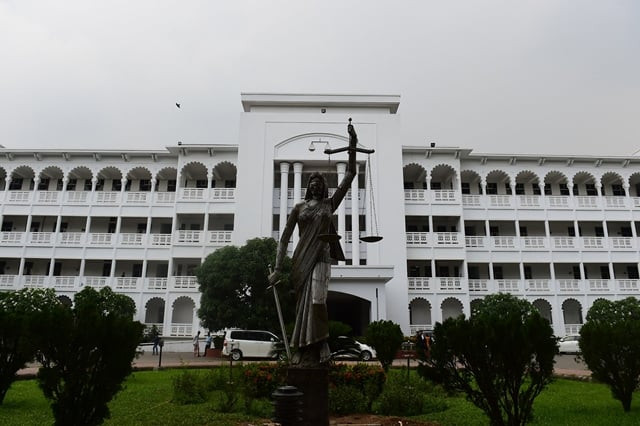Bangladesh reinstalls controversial statue after outcry
Its removal from the front plaza of Bangladesh's top court triggered violent clashes between police and secular groups

A statue denounced by religious hardliners as "un-Islamic" is pictured on the grounds of the Supreme Court in Dhaka after it was reinstalled on May 28, 2017. PHOTO: AFP
The sculpture of a blindfolded, sari-clad woman holding scales had been in place for less than six months when authorities removed it early Friday under pressure from hardliners, who said it was based on the Greek goddess of justice.
Its removal from the front plaza of Bangladesh's top court triggered violent clashes between police and secular groups, who saw the move as further evidence of creeping Islamisation in the officially secular country.
Bangladesh removes 'un-Islamic' justice statue from Supreme Court after protests
But the sculpture's creator Mrinal Haque, who had accused authorities of bowing to hardline groups, said he was asked to reinstall the statue at a different location on the court grounds.
"We have just placed the sculpture in front of the Annex Building of the Supreme Court," Haque told AFP on Sunday.
"I wasn't given any clarification but was only ordered to relocate it," he said, adding the new location was at the back of the court where hardly anyone could see it.
Militant groups held months of mass protests demanding the statue be destroyed and replaced with a Koran.
Prime Minister Sheikh Hasina, who leads the secular Awami League party, initially kept her distance from the row.
But she broke her silence last month to describe the statue as "ridiculous" after inviting top militant leaders to her residence.
Bangladesh jails high-profile militant leader for seven years
Mufti Faiz Ullah, a senior leader of hardline group Hefazat-e-Islam, threatened retaliation over the latest location.
"It should be removed immediately. Otherwise our movement will not stop," he told AFP.
Analysts say Hasina's stand on the statue was part of efforts to woo terrorists and conservative rural voters, before a general election expected next year.
Bangladesh has experienced increasing tensions between hardliners and secularists in recent years, with a number of atheist bloggers, religious minorities and foreigners murdered by militants.



















COMMENTS
Comments are moderated and generally will be posted if they are on-topic and not abusive.
For more information, please see our Comments FAQ